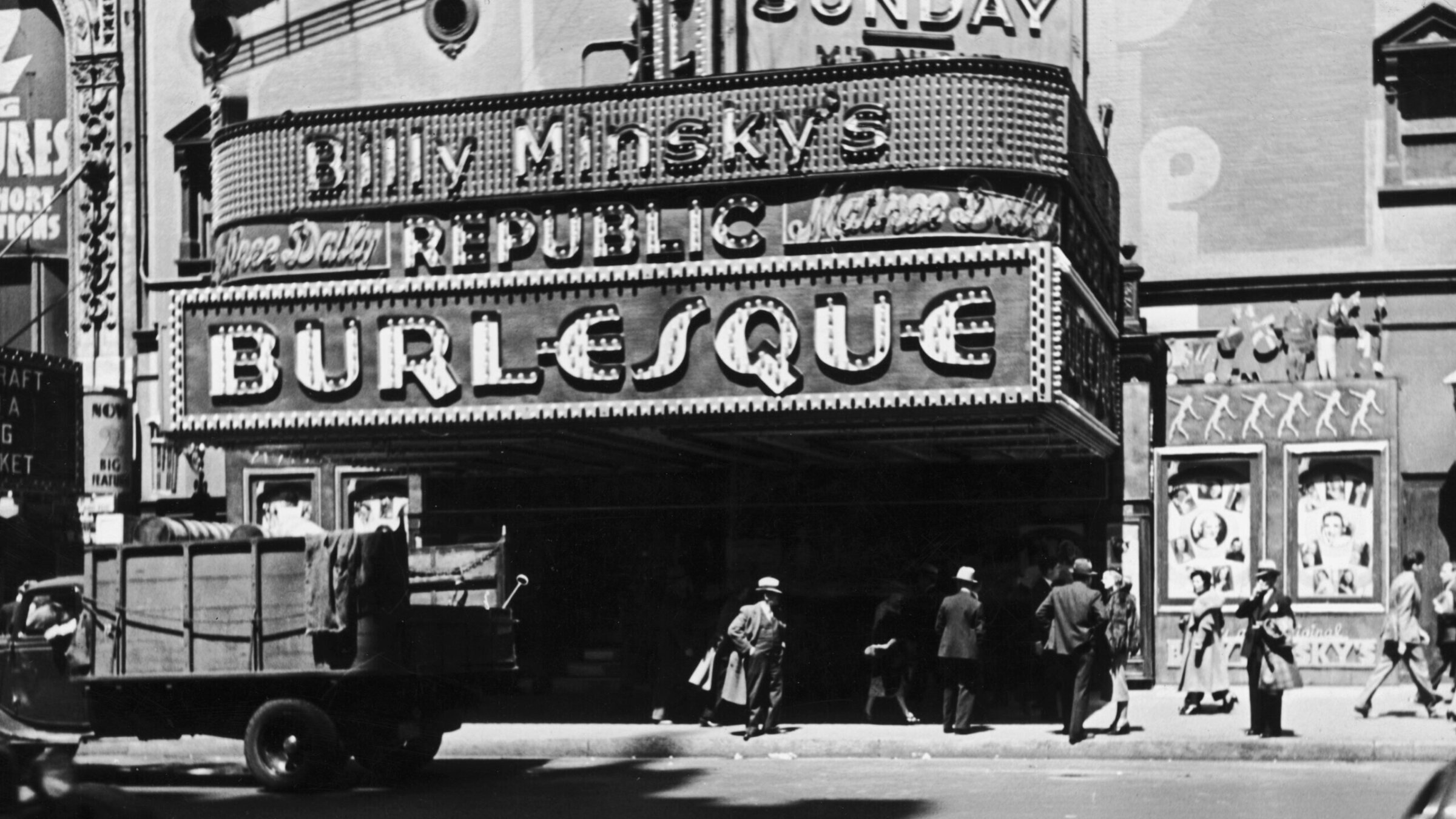In William Friedkin’s most Jewish movie, a mouth-watering elegy to the New York deli
‘The Night They Raided Minsky’s’ was the late director’s ode to Jewish food

The exterior of Minsky’s Republic Theater on Broadway. (The Minsky’s of the film was downtown on Houston Street.) Photo by AFP/Getty
The Night They Raided Minsky’s ends with an elegy to the seltzer bottle.
After the titular raid, a onetime vaudevillian known only as Professor Spats walks the stage, littered with the debris of his trade — sheet music, a feather boa — until he finds the empty bottle on the ground. Reverently, he lifts it and places it on the step of a ladder. As the camera closes in on the bottle, we see flashes of what it signifies.
Men laughing, cheering, jeering in a music hall audience. Within that bottle was not merely carbonated water, but the very spirit of slapstick and a bygone age of burlesque. But if you sit through the 1968 film, William Friedkin’s third feature, you may not find yourself missing the follies so much as a seltzer bottle’s other milieu: the deli.
The best shtick in The Night They Raided Minsky’s, written by Norman Lear, Sidney Michaels and Arnold Schulman, with music by Broadway orchestrator Philip J. Lang and Bye Bye Birdie songwriters Charles Strouse and Lee Adams, doesn’t happen onstage. It happens in the wings and at a nearby delicatessen.
It’s there that we meet the father-son team that own Minksy’s Burlesque, a real institution the cops raided multiple times in the 1920s for obscenity. Elliot Gould, in his second film, plays Billy Minsky, a schnorrer (moocher) who, while ordering nothing, helps himself to the free rye bread and pickles.
Billy’s talking with his father, Louis (Joseph Wiseman, who played Dr. No and Dr. J. Robert Oppenheimer). Men in kippahs chomp cigars and Louis warns his son about the man from the vice squad who has been taking notes in the house: “Where there’s smoke, there’s salmon,” he admonishes.
Friedkin, who filmed entirely on location in New York City, gives us a time capsule that is as gastronomic as anything. Deploying some innovative editing, he bait and switches period footage of vendors on the Lower East Side with his own recreations, giving up the game when he renders the new material in color. When Minksy’s resident clown Chick Wilson (Norman Wisdom) courts the guileless Amish heroine, Rachel Elizabeth Schpitendavel (Britt Ekland) from Smoketown, Pennsylvania, he does so by pressing a pushcart knish in her face like a piece of wedding cake.
The vibe at Minsky’s isn’t quite Second Avenue (the real theater, the National Winter Garden, was on Houston Street near Second Ave. — now a Whole Foods a block from Yonah Schimmel’s Knishes). Most of the characters aren’t Jewish. Still, when a tough named Trim Houlihan arrives at the deli and objects to the number of bagels in an order, it prompts one of the film’s best bits.
“Two bagels is an order of bagels anywhere in town,” Houlihan (Forrest Tucker) insists.
“I don’t care about anywhere in town,” the server (Herbie Faye of Phil Silvers Show fame) replies. “Here you order another bagel, you pay another nickel.”
When Houlihan calls the waiter cheap, it becomes a matter of principle. The server throws the bagel to the ground to demonstrate how little he’s motivated by profit. Houlihan starts throwing nickels, and soon the server’s tipping an entire bin of bagels to the ground.
Between this and Gould’s eventual lunch order (“a double on an onion roll, half pickles, half pastrami, sour tomatoes — no sauerkraut, my stomach’s acting up today”) it’s hard not to walk away craving Katz’s (three blocks from where Minsky’s once stood, FYI). But might one also be enlightened?
When Rachel’s father, Jacob, confronts Louis at home, in an effort to save his daughter from appearing onstage, the theater owner, who wears a kippah, suggests they pray. Soon, as the vice squad informant Vance Fowler (Denholm Elliot) enters and is made to wear a doily on his head, we’re given an interfaith dialogue.
Jacob threatens Minsky with the “finger of righteousness.” Fowler says his father, “an Episcopal vestryman,” used a different finger.
Louis insists they’re wrong. “There is no finger of righteousness,” he says. “This is the finger of cleanliness,” (pinky, to the ear). “This is the finger of marital bliss” (the ring finger). “This is the finger of vengeance” (middle). “This is the finger of meddling in other people’s lives” (index). “And this,” he raises his thumb aloft, “is the finger of transportation that will get us a taxi to the theater.”
“You speak with the fist of authority, gentleman,” Louis says. “But you don’t know your fingers!”
In the film, Friedkin was yet to grasp the full authority he’d master just a few years later.
“Minsky’s was way over my head,” Friedkin recalled in a 2007 interview. “I was struggling every day on the set.”
He leaned on editing tricks and faulted his own ignorance of the era with some of his stranger choices, which at times make it feel a bit like Gypsy as lensed by Gregg Toland and cut together by Jean-Luc Godard.
But it’s no accident that when the film succeeds, it usually does so around half-sours and lean pastrami. Maybe Friedkin found it heymish — or maybe he was just hungry.
















